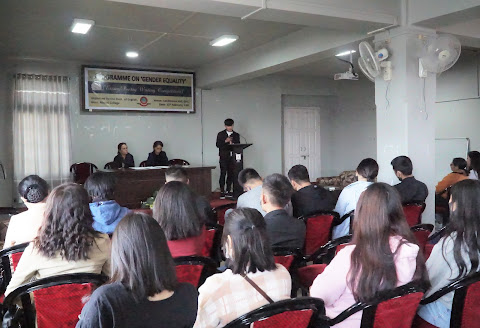What exactly is gender equality? Is it the equal access of resources regardless of gender? Or is it giving the other gender more advantages with no backlash or weight? Can there actually be perfect equality among the genders?
The 'feminism movement' started in the 15th century where women stood up and showcased rampant oppression of women, and till today new waves of female empowerment can be seen.
Due to lack of education and primal nature, society and people in general looked down upon women seeing them to just 'breed a child,’ 'take care of a family,’ they were not taken seriously which caused a lot of abuse, and having a daughter was unfavourable. This can be seen in all kinds of societies, even us Mizos have a handful of stories about abusive drunk dads who beat their wives and children, and when it comes to India there have been practices of child marriage where the parents find a partner for their child and get married by the time they are 'old enough' which leads them to get married to middle aged-old men who are often alcoholic or abusive in general. After going through all the hardships, if these men they married were to die early, these women would be seen as widows, and Indians being as superstitious as they are, see these widows as an omen bringing them bad luck, hence they would get incinerated along with their husbands.
Education plays an important role at how women are treated at present, but it sure is not in a perfect state especially when we look at the Middle East where the women have no rights to choosing their partners, domestic violence is high, there is discrimination in employment, healthcare, inequality in child custody, divorce, inheritance. Meanwhile us (Mizos) in a male dominated (patriarchal) society face little to no discrimination against women, in some cases due to religion the woman's family may not permit the girl to be with her man due to their differences.
When it comes to job opportunities, Mizoram actually has seats saved for women, and this is where the question of if they have an 'advantage' or 'equal access of resources' comes in, and why aren't there seats saved for men too? It's not like they got their position for free, or when it comes to being 'chivalric' or 'pasaltha' in our words is to give women seats at public places or transport, when it comes to wars the women and children are spared, when it comes to tragedies they are still the ones prioritized for safety.
The reason women worked less then is no question that they chose to be at home with the children and be a mother while the father worked, this has typically been the norm for a very long while. Again due to the emergence of education, women nowadays are working hard to be independent and have a head start before their marriage in order to avoid having financial hardships. This is becoming the social norm and a healthier approach to starting a family, realistically not all marriages work and it is horrible when the woman is left with nothing else.
The points elaborated above are to highlight that the perfect or ideal form of gender equality is impossible to be practised and I believe that women in our society are in a better place than at any time in our history. Then again this doesn't mean gender discrimination does not exist anymore or we should stop being open to new ideas. Rather implementation of better practices or of improving the system bit by bit will go a long way in getting to our ‘ideal' sense of society.
Steven Ramthanmawia is a 3rd semester student. He bagged third place and a cash prize of Rs 1000/- with this essay.
